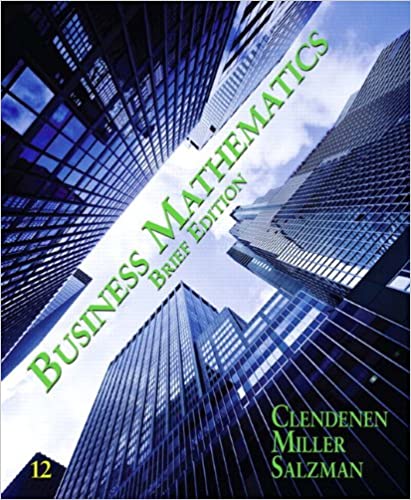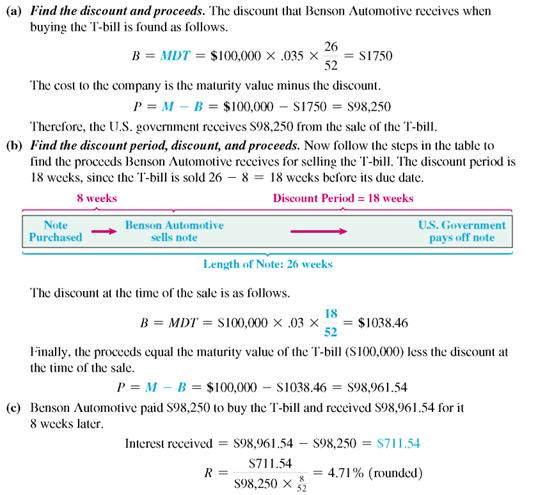
Business Mathematics Brief 12th Edition by Stanley Salzman ,Gary Clendenen, Charles Miller
Edition 12ISBN: 978-0132605540
Business Mathematics Brief 12th Edition by Stanley Salzman ,Gary Clendenen, Charles Miller
Edition 12ISBN: 978-0132605540 Exercise 151
Explain the effect of a rise in general market interest rates on an investor who is holding notes. Give an example. (See Example.)
Finding the Proceeds
Benson Automotive used excess cash to purchase a $100,000 Treasury bill with a term of 26 weeks at a 3.5% simple discount rate. However, the firm needs cash exactly 8 weeks later and sells the T-bill. During the 8 weeks, market interest rates changed slightly so that the bill was sold at a 3% discount rate. Find (a) the initial purchase price of the T-bill, (b) the proceeds received by the firm at the subsequent sale of the T-bill, and (c) the effective interest rate.
SOLUTION

The company would have earned 3.5% on the T-bill had it left the Treasury bill invested until maturity. Instead, the company sold it after market interest rates rose, but before the T-bill matured. This caused the company to end up with an effective interest rate somewhat higher than the 3.5%.
Finding the Proceeds
Benson Automotive used excess cash to purchase a $100,000 Treasury bill with a term of 26 weeks at a 3.5% simple discount rate. However, the firm needs cash exactly 8 weeks later and sells the T-bill. During the 8 weeks, market interest rates changed slightly so that the bill was sold at a 3% discount rate. Find (a) the initial purchase price of the T-bill, (b) the proceeds received by the firm at the subsequent sale of the T-bill, and (c) the effective interest rate.
SOLUTION

The company would have earned 3.5% on the T-bill had it left the Treasury bill invested until maturity. Instead, the company sold it after market interest rates rose, but before the T-bill matured. This caused the company to end up with an effective interest rate somewhat higher than the 3.5%.
Explanation
If the there is a rise in general market...
Business Mathematics Brief 12th Edition by Stanley Salzman ,Gary Clendenen, Charles Miller
Why don’t you like this exercise?
Other Minimum 8 character and maximum 255 character
Character 255


